Aug 2011
Aug 2011 Estelle Greeff
New hospital for a healthier Limpopo
New hospital for a healthier Limpopo sadminPresident Jacob Zuma announced plans for a R250 million hospital in Limpopo to address critical challenges in the province's health system.
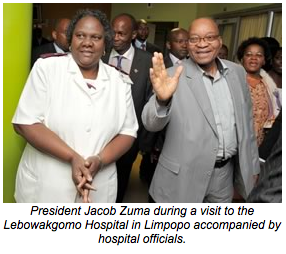 A new state-of-the-art hospital is on the way for Siloam village in Limpopo. President Zuma made this announcement during a recent visit to the province where he focused on healthcare needs in one of South Africa's most rural regions.
A new state-of-the-art hospital is on the way for Siloam village in Limpopo. President Zuma made this announcement during a recent visit to the province where he focused on healthcare needs in one of South Africa's most rural regions.
The President's visit forms part of his performance monitoring exercise to ensure that government's targets to improve conditions in the country are met. These targets focus on the priorities of health services, education, jobs, safety and security and rural development.
Other provinces
Accompanied by Minister in the Presidency Collins Chabane, Health Minister Aaron Motsoaledi and Limpopo Premier Cassel Mathale, it was the second regional visit of this kind by the President. The first was to the Eastern Cape where President Zuma zoomed in on education. He is scheduled to visit five other provinces in the coming months.
Speaking to about 200 people at Siloam village, some 40 kilometres from Beit Bridge on the border with Zimbabwe, Zuma said the hospital would be built in phases over a period of three years to replace the old one in the area.
Performance monitoring
“We are here to do performance monitoring and evaluation and we are (checking) how government is performing and as part of that we want to ensure that you are happy with the services that are being rendered to you,” the President said.
He said the new monitoring and evaluation approach would ensure that issues of health and education became a top
priority on government’s service-delivery agenda. President Zuma inspected the current Siloam Hospital where he saw the challenges first-hand.
Concrete monitoring
Members of the community complained about poor service and bad conditions at the hospital. Nurses also came in for harsh criticism from residents. They complained that they often had to wait for several hours at the hospital before receiving attention.
The President promised the community that their complaints would be investigated and that action would be taken.
“The monitoring we are doing is not through papers, it is concrete and we want to see and hear what people are saying so when something is not working it can be changed.”
'Speak your minds'
Poor people living in shacks made use of the opportunity to ask the President to address other pressing problems such as unemployment and lack of facilities. He pointed out that his visit focused on health matters, particularly the hospital, but asked those who raised other issues to write them down and pass the list to his officials.
The President encouraged those who attended to speak their minds. “Don’t be afraid of the Government,” he told them.
After the meeting in Siloam, President Zuma went on to visit a hospital in Lebowakgomo.
Celebrating South African women
Celebrating South African women sadminEvents and advice
South Africa celebrates Women's Month in August with a special focus on Women's Day on 9 August every year. On this day in 1956, women from all races and walks of life marched to the Union Buildings in Pretoria to protest against oppressive apartheid laws. This marked a turning point in the role of women in the struggle for freedom and society at large.
This year, Women’s Day celebrates the 55th anniversary of the women’s march led by Lillian Ngoyi, Helen Joseph, Rahima Moosa and Sophia Williams-De Bruyn.
Women’s Month is celebrated with activities that pay tribute to the important role of women in society. It is also an opportunity to focus on challenges regarding women’s empowerment and gender equality and for government departments to look at measures to address these challenges.
The theme for Women’s Month 2011 is “Working together to enhance women’s opportunities to economic empowerment”.
In this regard, the Department for Women, Children and People with Disabilities is taking action to improve the lives of women and girls. This is based on the priorities identified by the department in line with government’s key national priorities and 12 outcomes.
These include job creation, decent work and sustainable livelihoods for women, funding mechanisms for increasing opportunities for women’s economic empowerment; education for women and girls; women’s health, especially the negative impact of HIV and AIDS on women and girls; addressing the growing rate of gender-based violence; and rural women’s development, land reform and food security for women and girls.
For more information, call
012 359 0013 (Pretoria) or
021 469 8300 (Cape Town)
Letters to the Editor - Give us a piece of your mind
Letters to the Editor - Give us a piece of your mind sadminWinning letter - Rise above your handicaps
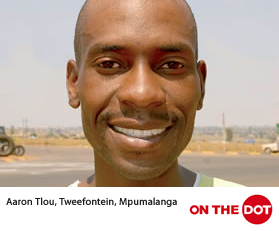 There are many men and women who have changed the course of history and enriched the lives of future generations, despite having to overcome enormous obstacles, like physical handicaps. We have to read our history books and encyclopaedias to see the number of outstanding people who rose above their disabilities and left indelible marks on the world. Look at American Helen Keller, for example. She was born blind, deaf and mute, but through sheer determination and dogged refusal to let her extreme handicaps stop her from acquiring knowledge, she went on to become a highly-educated woman.
There are many men and women who have changed the course of history and enriched the lives of future generations, despite having to overcome enormous obstacles, like physical handicaps. We have to read our history books and encyclopaedias to see the number of outstanding people who rose above their disabilities and left indelible marks on the world. Look at American Helen Keller, for example. She was born blind, deaf and mute, but through sheer determination and dogged refusal to let her extreme handicaps stop her from acquiring knowledge, she went on to become a highly-educated woman.
Whatever your handicap may be, never allow it to destroy your true potential. To those who are physically challenged, I say, be proud of who you are.
– Aaron Tlou, Tweefontein, Mpumalanga
We would like to hear from you
If any of the information published in Vuk’uzenzele has helped you in any way to improve your life, we would love to hear all about it. For example if Vuk’uzenzele has motivated or helped you to start your own business, getting a bursary or a job, please tell us how we have helped you. Don’t forget to include your telephone or cellphone number and address.
Use water wisely
Without water there would be no life. Water plays an important role in our lives and bodies. It is the most important of all chemical compounds on earth. Without it all human beings and animals will die of thirst, and plants will wilt and die. A person can survive several days without food, but only a few hours without water. So, please let’s use water wisely and teach our children to do so too!
– Emily Mathe, Lindley, Free State
Pillar of strength
It is with great pleasure that I’m saying I got confidence from reading your magazine. You are a pillar of strength, you reach to the bottom things and climb the landscapes of this country to change people’s lives for the better.
You have made me realise that there is more to life than sitting at home with nothing to do but blaming government for not providing for us. The words of encouragement you give means a lot to many people. Keep up the good work.
– Thabo Bosigo, Hennenman, Free State
Let us read
The March edition of Vuk’uzenzele magazine encouraged me to read daily in order to improve my language, reading skills and vocabulary by the information you published about libraries. I am proud to tell you that I now spend most of my time at the library, thanks to Vuk’uzenzele.
I urge everyone to visit their libraries often and discover the world of information. You can use the Internet for free and it is the quietest place to do your school work or even study for exams. Let us all read more and eradicate illiteracy in our communities.
– Khakhau Sedikanelo, Qwaqwa, Free State
Don't accept abuse
There are different kinds of abuse – verbal, financial, emotional and physical. No one has to accept being abused – succumbing to it kills you alive and leaves you with scars and bruises. We have the right to be free and safe at all times. Being controlled is not an option; remember, it’s never too late to get out of a situation.
Respect and tolerance is the key to good parenting. If you and your children are abused, get yourself and your children out of that situation. Be brave and stand up for your rights.
– Salome Sekete, Atteridgeville, Gauteng
Send your letters to:
Vuk'uzenzele, Private Bag X745, Pretoria, 0001, or e-mail: vukuzenzele@gcis.gov.za.
If you don’t want your real name published you may use a different name, but please include your real name and address.
Please note:
To win a prize you must include a physical address and a contact telephone number.
Prizes that re not claimed within 90 days of publication, will be forfeited.
To win a prize you must include a physical address and a contact telephone number.
Prizes that re not claimed within 90 days of publication, will be forfeited.
More than 11 million people tested for HIV
More than 11 million people tested for HIV sadminSouth Africa has one of the highest rates of HIV infection in the world, but government's effort to reduce this rate is paying off.
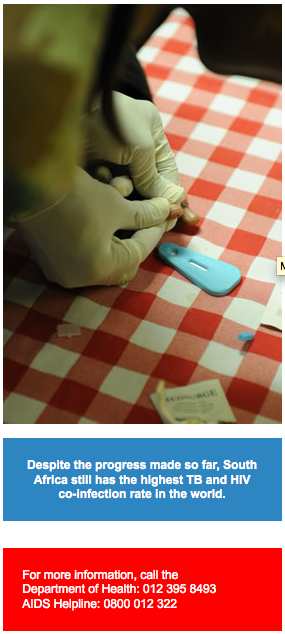 Since the launch of government’s HIV Counselling and Testing (HCT) campaign, more than 11 million South Africans have tested and this figure is growing every month.
Since the launch of government’s HIV Counselling and Testing (HCT) campaign, more than 11 million South Africans have tested and this figure is growing every month.
Before government started its HCT campaign in April last year, about 900 000 people were on antiretroviral (ARV) treatment but now more than 1,4 million people are on treatment. This is due to the price being reduced by 53 per cent, which means more patients can be treated.
Previously, only 490 health centres were able to provide ARVs as official service points and only 250 nurses were certified to provide ARVs. The number has now increased to 2 205 centres and 2 000 certified nurses.
Improved access
“This has increased access to treatment in a manner unimagined just over a year ago,” said Health Minister Dr Aaron Motsoaledi.
“Our target is that all 4 000 health outlets should be accredited as ARV centres by the end of the year and our target is over 4 000 nurses to be certified by the end of the year.”
The Minister said as part of the Department of Health’s programme to expand treatment and in a bid to reduce the burden of HIV and TB, treatment would also be provided to prisoners. To this end, the department has already signed an agreement with the Department of Correctional Services and with Minister Nosiviwe Mapisa-Nqakula.
TB and HIV co-infection
However, despite the progress made so far, South Africa still has the highest TB and HIV co-infection rate in the world. South Africa makes up only 0,7 per cent of the world’s population, but we are carrying 17 per cent of the world’s HIV and AIDS burden.
In addition, South Africa has the highest TB infection rate per population, and our TB and HIV co-infection rate is the highest in the world, at 73 per cent. A total of 35 per cent of child deaths and 43 per cent of maternal deaths are as a result of HIV and AIDS and one in every three pregnant women who visit our antenatal clinics is HIV positive.
Taking action to prevent maternal deaths
Taking action to prevent maternal deaths sadminSouth Africa has more than one million maternal orphans, said Health Minister Aaron Motsoaledi in Parliament recently.
He said a high number of young mothers were HIV positive and many died while giving birth. He warned that this situation had a negative effect on South African society beyond health care, or teenage pregnancies and young husbands who lose direction in life when they lose their wives at such a young age.
Special steps
Government is well aware of this situation and is taking special action to improve healthcare for mothers and babies, especially in relation to the issue of HIV, Motsoaledi said.
Government’s new approach to HIV will ensure that all pregnant women living with HIV get antiretroviral (ARV) treatment when their CD4 count drops below 350.
CD4 count, or T-cell count as it is sometimes called, are cells in our bodies that are attacked by HIV and used to make more copies of HIV. This weakens the immune system, making it unable to protect the body from illness
and infection.
Prevention
Prevention of mother-to-child transmission now starts at 14 weeks of pregnancy instead of 28 weeks. The Department of Health is also running intensive immunisations campaigns.
The department will also host a breastfeeding summit this month to look at the different types of feeding and the benefits of breastfeeding as part of its measures to prevent mother-to-child infection,
Unhealthy living
Minister Motsoaledi further noted the effects of diseases that are caused by an unhealthy lifestyle like unbalanced eating, lack of exercise, smoking and alcohol abuse. These lead to more serious health problems like high blood pressure and heart disease.
He said risk factors like smoking and alcohol abuse must be removed before diseases such as high blood pressure can be tackled effectively.
Powerful tobacco and alcohol companies can forget about government changing its mind on enforcing a total ban on advertising for these substances, he said.
For more information, call the Department of Health: 012 395 8493
AIDS Helpline: 0800 012 322
Ward off the flu bug
Ward off the flu bug sadminWinter is not over yet and people are still at risk of getting flu. Flu is spread mainly from person-to-person through coughing, sneezing or touching. Symptoms include sudden onset of fever, dry cough, muscle pain, body aches, runny nose, sore throat or hot and cold shivers.
Steps to limit your chances of getting flu
- Cover your nose and mouth with a tissue when you cough or sneeze and throw away the tissue after use.
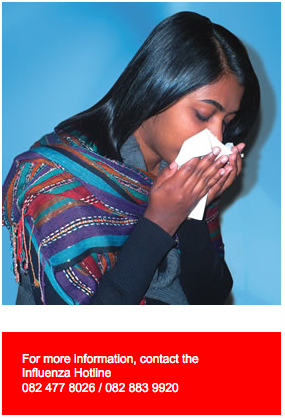
- Wash your hands often with soap and water, especially after you cough or sneeze.
- Try to avoid close contact with sick people.
- If you have flu, limit contact with others so that you don’t infect them.
- Avoid touching your eyes, nose or mouth germs spread this way.
- Drink lots of liquids and get some bed rest.
- People who are at risk of getting more seriously ill from flu like the elderly, young children or those who are HIV positive, should be treated as soon as possible after flu symptoms develop.
Warning signs
Shortness of breath, ongoing or high fever, rapid breathing, chest pain and persistent vomiting are warning signs of severe influenza infection. This requires urgent treatment.
Committed to root out corruption
Committed to root out corruption sadminThe Police Department is committed to root out corruption among police officers, as well as to investigate allegations of corruption within government and the private sector, Police Minister Nathi Mthethwa told an Anti-Corruption Symposium in Midrand recently.
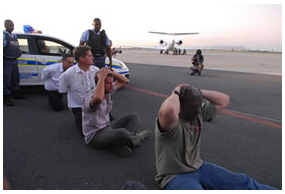 If you have a story to tell about how an official was happy to take R20 or a can of Coke from you in return for a favour or overlooking something you did wrong, you’d better keep the story to yourself if you don’t want to get caught.
If you have a story to tell about how an official was happy to take R20 or a can of Coke from you in return for a favour or overlooking something you did wrong, you’d better keep the story to yourself if you don’t want to get caught.
It takes two (sometimes more) to commit corruption and the South African Police Service (SAPS) is out to get you with a new, revised Anti-Corruption Strategy. The strategy will focus on four important elements: prevention, detection, investigation and restorative actions.
To ensure that this works, anti-corruption action plans have been developed at divisional, provincial and police station levels.
Challenges
Over the past two years, SAPS have conducted more than 1 061 investigations into its own members who were allegedly involved in corruption. But there are a number of challenges that still need to be addressed. These include the unwillingness of police officers to report corrupt activities by their colleagues and reluctance of some police administrators to acknowledge corruption.
Speaking in Midrand recently, Police Minister Nathi Mthethwa acknowledged the “decisive action” taken by the Hawks the police unit tasked to prevent, combat and investigate national priority crimes to fight corruption in government and the private sector.
There are currently 37 priority cases under investigation. The Hawks have also arrested 21 suspects involved in corruption relating to R437 million.
The Hawks established an Anti-corruption Unit that works in collaboration with different government departments. So far 76 public officials have been arrested.
Clean audit
The Hawks have also established Operation Clean Audit in collaboration with the Department of Cooperative Governance and Traditional Affairs to keep an eye on corruption in local government.
A total of 362 cases have been reported or are being investigated. 144 public officials and 120 members of the public have appeared in court.
Linked to some of these cases, the Hawks have also secured the conviction of 60 public officials and 29 members of the public.
Better policing
Mthethwa said with its revised strategy the SAPS wanted to achieve better policing, an efficient criminal justice system, involvement of society in the fight against crime and restoring the moral fibre of South Africans.
He acknowledged that better accountability and transparency was needed to avoid corrupt activities, as well as stronger action against both those who corrupt and those who were corrupted.
-
Ending corruption starts with you
While the police and other arms of government are at the forefront in the fight against corruption, ordinary South Africans have their own role to play.
As a citizen you can help rid the country of corruption by not becoming involved in corrupt activities and reporting any corruption you suspect or are aware of.
A number of hotlines and helplines have been created by government to ensure that you can pass on information without having to reveal your identity.
- Corruption is a crime and can be reported to the police. You can pass on any information you may have without having to give your name or personal details. If the information helps in the positive investigation of a criminal case, you may be entitled to a reward. Call the Crime Stop number 08600 10 111.
- Anonymous tip-offs on criminal activities can also be sent to Crime Line. You can send an SMS containing information to 32211 at a cost of R1 per SMS.
- In addition to the above numbers, you can also call government’s National Anti-Corruption Hotline and pass on information on corrupt activities you are aware of without giving your name. The number is 0800 701 701.
SAPS top brass tour stations to shape up services
SAPS top brass tour stations to shape up services sadminPolice top management inspected 126 police stations throughout the country as part of their efforts to improve service delivery.
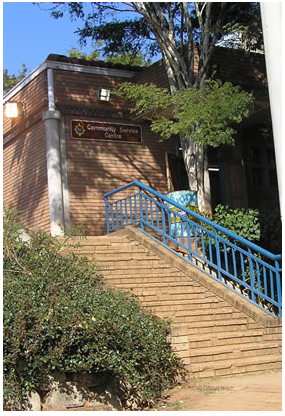 Q: Who do the police call when they need help?
Q: Who do the police call when they need help?
A: National Commissioner Bheki Cele and his top team.
The police may be in the business of keeping communities safe and coming to the rescue of citizens in distress, but they have distresses of their own.
Hands-on approach
To address challenges faced by police at station level, General Bheki Cele and top management visited various stations in each of the nine provinces during a year-long tour in which they inspected 126 police stations until the end of June.
General Cele said with an organisation as big as the South African Police Service, which has 190 000 members and 1 120 police stations, it was important to have a hands-on approach in managing it.
We now have a "thorough understanding of the challenges, morale and successes achieved at the grassroots level of policing, and that enables and empowers us to be better managers and make sound decisions," General Cele said after the visits.
Making better decisions
General Cele, together with Deputy National Commissioners, Divisional Commissioners from Head Office and Provincial Commissioners inspected stations and interacted with staff.
At the end of the visits, the SAPS National Management Forum was expected to meet and exchange information they gathered during their inspection of the police stations. Discussions about the challenges they encountered will help them to come up with solutions to improve conditions and morale.
At the same time, positive aspects or best practices that were identified at some of the stations will be used as guidelines to improve stations that did not measure up.
ANA sums up ways to improve education
ANA sums up ways to improve education sadminThe Basic Education Department has announced the results of the Annual National Assessment for numeracy and literacy skills. Six million learners in Grades 1 to 3 and Grades 4 to 6 in government schools wrote the tests.
The Annual National Assessment (ANA) tests set by the Department of Basic Education are among the department’s key plans to improve learners’ success rate by 2014.
The tests, which take place in February each year, aim to provide a basic education standard for all schools. They measure, at primary school level, the performance of individual learners, as well as that of classes, schools, districts, provinces and the country as a whole.
Improve the system
The ANA tests are not like examinations, which help schools to make decisions on promoting learners to the next level. The information gained from ANA is used to find out why learners do not perform at an individual level and to help make decisions within school the system. The department uses the results to identify areas of weakness.
Results
South African learners performed poorly in recent international and local assessments. Basic Education Minister Angie Motshekga acknowledged that not enough attention had been given to the development of reading, writing and numeracy skills at the foundation levels and said more focus would be placed on them.
Performance
The ANA results showed that nationally, Grade 3 learners performed at an average of 35 per cent in Literacy and 28 per cent in Numeracy, while the provincial performance stands between 19 per cent and 43 per cent, with the highest being the Western Cape.
In Grade 6, the national average performance in Languages is 28 per cent, while Mathematics performance is 30 per cent. Provincial performance ranged between 20 per cent and 41 per cent, with the highest being the Western Cape and lowest being Mpumalanga.
Interventions
The department’s interventions include the distribution of 15 000 foundation phase learning packs for use by teachers from Grade R to 3. These will involve the development of lesson plans and assessment frameworks.
Tel: 012 357 3000
Fax: 012 323 6260/ 0601
School grades due for an upgrade
School grades due for an upgrade sadminChildren who can't read, write, count or speak well in their mother tongue or a second language are unlikely to make a success of their schooling or succeed in the workplace one day.
Improving their chances of success in life and improving the prospects of the South African economy therefore depends on how well children do in the basic areas of learning in their early years at school.
In a bid to improve the quality of learning and teaching, all learners in Grades 1 to 3 (Foundation Phase) will be required to take four subjects from 2012. These are Home Language, First Additional Language, Numeracy and Life Skills.
Basic skills
The focus will be on strengthening basic skills such as reading, writing and numeracy. This will better prepare Foundation Phase learners for the jump to Grades 4 to 6 (Intermediate Phase). The number of subjects in the Intermediate Phase will also be reduced as part of strengthening foundational skills.
To this end the Department of Basic Education has put together an updated document called the Curriculum and Assessment Policy Statements (CAPS).
CAPS sets out revised plans for the national schools curriculum based on the recommendations of a panel of experts. It will replace current documents and will provide clear guidelines on what teachers should teach and assess on a grade-by-grade and subject basis. It will be phased into the Foundation Phase in 2012.
Home language
Reviewing the curriculum in 2009, showed that the leap between the Foundation Phase and the Intermediate Phase was too large. Learners were not properly prepared for the jump from three subjects to eight. It was found that this was probably the main reason why results dropped as learners moved up the grades, said Basic Education Minister, Angie Motshekga.
The Minister emphasised that English would not replace the home language in the early grades. Where it is practically possible, each learner will be taught in his or her home language in these grades.
For more information, contact the Department of Basic Education
Tel: 012 357 3000
SABMiller brews an amaize-ing partnership
SABMiller brews an amaize-ing partnership sadminThe KwaZulu-Natal yellow maize public-private partnership will see many farmers in KwaZulu-Natal selling at least 5 000 tonnes of yellow maize a year to South African Breweries-Millers (SABMiller.)
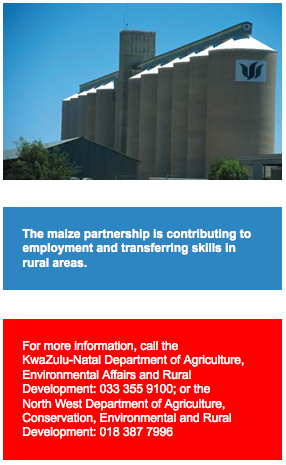 This follows an agreement between SABMiller and the KwaZulu-Natal Department of Agriculture, Environment and Rural Development in October last year.
This follows an agreement between SABMiller and the KwaZulu-Natal Department of Agriculture, Environment and Rural Development in October last year.
The agreement involves communities from Bergville, Mbabazane and Indaka for the production of yellow maize grown without pesticides and chemicals. The first crop from the agreement is due to be harvested this year.
Boost for emerging farmers
The SAB market is a major boost for emerging black farmers with many subsistence farmers set to benefit from this partnership.
Before the signing of the public-private partnership agreement, most subsistence maize farmers in KwaZulu-Natal struggled to find markets for their produce.
SABMiller will buy 5 000 tonnes in the first year of the project and the quantity will increase over time. At least 1 500 hectares of good farming land has been identified in Bergville and Umtshezi near Estcourt in the KwaZulu-Natal Midlands.
Beyond KZN
SABMiller's partnership with KZN builds on a number of projects involving other provinces.
The beer company has also been involved with a group of barley farmers in the Taung area of the North West province for the past 16 years. Called the Taung Barley Farmers Project, this partnership was recognised as the African Agricultural Commodities Initiative of the Year during the inaugural Africa Investor Agribusiness Investment Awards last year.
North West
The Taung Barley Farmers Scheme on the border between the North West province and the Northern Cape was launched by SABMiller in 1994 to encourage enterprise development.
The project is managed by SABMiller in partnership with the North West Department of Agriculture, Conservation, Environment and Rural Development and the local tribal authority.
It consists of about 1 500 hectares of land and helps around 150 emerging farmers generate an income from barley and maize in the area.
Guaranteed market
SABMiller provides funds to grow the crops, as well as a guaranteed market. They also provide agricultural extension services to ensure good quality crops.
Through a partnership with GrainSA, a voluntary association of grain farmers, the project is able to provide skills that empower farmers to work independently on an ongoing basis.
Organic job growth on East Rand
Organic job growth on East Rand sadminWhen a group of unemployed people on the East Rand joined hands to start an organic farming business to support their families, its success exceeded their expectations.
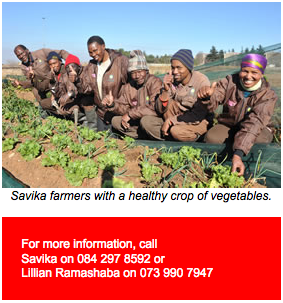 Three years after a group of unemployed people from Kwa-Thema planted the seeds for the Savika Agricultural Primary, this unique venture is sprouting all over the East Rand.
Three years after a group of unemployed people from Kwa-Thema planted the seeds for the Savika Agricultural Primary, this unique venture is sprouting all over the East Rand.
Today, they use three hectares of land donated by the Ekurhuleni East College to farm organic vegetables. This not only helps them to put food on the table for their families, but to supply other markets and local shops.
Cooperative
In 2009, the Savika Agricultural Primary registered as a cooperative and today the business is run by seven committed members.
From small beginnings, they now produce enough to supply organic vegetables to the fresh produce market in Springs, as well as to a mini butchery in Springs and Pick 'n Pay in Duduza.
Developing skills
The Savika team did not achieve success overnight. They worked very hard to get the business going, but realised that they needed to improve their farming skills. To this end, they received three months’ training and guidance on effective farming methods from the Afrisun East Rand Community Trust (AERCT) from January last year.
Training included the correct way to dig trenches and to test and fertilise soil before planting. In addition to the training, they also received tools.
In November last year, three Savika members, Lillian Ramashaba, David Mavimbela and Columbus Zitha, received further training. Sponsored by the Gauteng Department of Health, they attended a training course in agriculture at the Tshwane University of Technology, which they completed successfully.
Employing more people
Savika’s mission is to be a sustainable producer of organic vegetables. They also aim to create jobs by employing more people from their community and to teach people about the importance of organic farming.
Lillian Ramashaba said she hoped that in the near future more people in the community could have land to run their own farming businesses. She emphasised the importance of teaching youngsters in rural communities about organic farming, encouraging them to become entrepreneurs and making things happen for themselves.
Water Affairs taps into women workers
Water Affairs taps into women workers sadminPromoting career advancement is one of the Department of Water Affairs' development programmes for women during the next year.
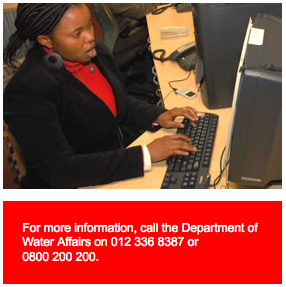 In line with government's aims to empower women in the workplace by providing equal access to education, training, science and technology for women, the Department of Water Affairs has introduced a new Accelerated Development Programme.
In line with government's aims to empower women in the workplace by providing equal access to education, training, science and technology for women, the Department of Water Affairs has introduced a new Accelerated Development Programme.
The aim of the Water Affairs Accelerated Development Programme is to promote career advancement among junior to mid-level employees in the department. This is one of the department's development programmes for women during the next year.
Potential managers
According to Water and Environmental Affairs Deputy Minister Rejoice Mabudafhasi, most employees at junior and mid levels are professionals who have either just recently completed their tertiary qualifications or have been occupying such levels without career progression for a long period.
The Accelerated Development Programme for middle management aims to develop mid-level managers to take on senior management positions. The Accelerated Development Programme for junior managers will serve as a pool for middle management candidates.
The aim is to grow and develop potential managers, so that they are ready when opportunities arise.
Life beyond work
The programme will also develop young women and women who are nearing retirement. The skills acquired from the programme will help the department's employees who are nearing retirement to prepare for life beyond work, while the younger women will be a feeder to the junior management level.
"When you retire the skills are transferred to others," said Minister Mabudafhasi. Once you've developed yourself, you are going to live sustainable lives and participate in your economy. You can also start your own businesses and empower other women."
Clean water, more jobs, better skills
Clean water, more jobs, better skills sadminThe Gauteng region of the Department of Water Affairs is joining hands with the Gauteng-based Rand Water Foundation to fight unemployment and develop skills. They are not only providing clean water to communities in five Gauteng local municipalities, but have created jobs for young unemployed graduates.
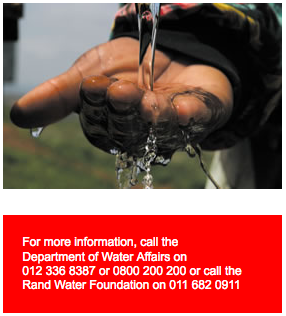 Called Sebenza Nathi (isiZulu for Work with Us), the project has helped to close the skills shortage in five municipalities. In addition, it has helped with the hiring of qualified engineering, water and science graduates who have been placed on long-term internship programmes within these municipalities.
Called Sebenza Nathi (isiZulu for Work with Us), the project has helped to close the skills shortage in five municipalities. In addition, it has helped with the hiring of qualified engineering, water and science graduates who have been placed on long-term internship programmes within these municipalities.
Internships
Currently, 23 unemployed graduates, including nine women, are employed in five municipalities as water treatment plant technicians.
The Rand Water Foundation entered into an agreement with the five municipalities binding them to hiring the interns permanently on completion of their internships.
The five municipalities are Midvaal Local Municipality in Meyerton, the Randfontein Local Municipality, the Lesedi Local Municipality, the Merafong Local Municipality and the Emfuleni Local Municipality.
The Vaal University of Technology is providing specialised training to the interns who already have qualifications in different water, science and engineering fields.
Funding
The Rand Water Foundation has made available R1,8 million in funding. The money covers monthly allowances paid to the interns, handbooks, protective clothing worn during training and study fees to the Vaal University of Technology to train the interns on waste water works management.
The interns are also trained in how the local government and water sector work, operational planning, municipal finance and budgeting and will complete a refresher course on water and sanitation.
According to the Water Affairs Department’s Thami Mnguni, the Sebenza Nathi project forms part of a broader community empowerment programme in the department. The total budget for the Community Empowerment Programme in Gauteng is R400 million, Mnguni said.
There are three other programmes within the Community Empowerment Programme. These are:
- The War on Leaks Programme, which addresses water losses resulting from leaks. About R100 million has been made available for the project.
- A skills development programme which received R80 million, provides training in water-related fields.
- Adopt a River, a community-based environment initiative targeting women and youth to clean rivers in their communities.
The Department of Water Affairs works with other partners including local municipalities, provincial governments, Rand Water Foundation, Sector Education and Training Authorities (Setas) and non-governmental organisations in carrying out these community programmes.
Bursaries: SAFCOL (South African Forestry Company)
Bursaries: SAFCOL (South African Forestry Company) sadminSouth African Forestry Company (SAFCOL) is the Government's forestry company, conducting timber harvesting, timber processing and related activities both domestically and internationally. It is undergoing a strategy review for its eventual disposal.
Introduction
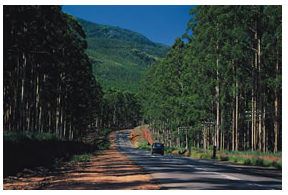 SAFCOL/KLF recognises people as the nucleus of any company. Development and training within an organizational context is an investment that will pay return on the company’s investment in terms of motivation, enhanced performance and commitment
SAFCOL/KLF recognises people as the nucleus of any company. Development and training within an organizational context is an investment that will pay return on the company’s investment in terms of motivation, enhanced performance and commitment
SAFCOL/KLF commits resources and time to ensure that learners are able to access education and training opportunities in order to plough their learning experiences back into the surrounding communities, industries and the country.
SAFCOL/KLF invests substantially in skills and development programmes. The programmes include bursary schemes aimed at the development of learners according to the needs identified in our business with preference to young people from historically disadvantaged communities specifically those adjacent to our operations. People with a disability are eligible to apply. SAFCOL/KLF aims at is to ensuring that opportunities are made available within a framework that addresses race, gender and disability.
SAFCOL/KLF offers opportunities to qualifying learners who wish to pursue a career towards a Degree or Diploma in the following priority fields:
Field of study
- Forestry/Research
- Sawmilling (Wood Technology)
- Civil and Mechanical Engineering
Limited space is available to learners who wish to study towards the following fields of study/ Disciplines.
- Finances/ Accounting
- Information Technology
- Environmental Management
- Human Resources
- Marketing
To be eligible for the SAFCOL/KLF Institution of higher learning bursary, you must
- be a South African citizen
- have Matric exemption
- be proficient in English
- Mathematics HG (C),
- Physical Science HG (C)
- Biology HG (C)
- computer literate, MS Word and Excel
- comprehensive selection testing and a psychometric test is compulsory
- allocation of bursary based on merits
- compulsory Learnership Forestry Bridging Programme (1 year)
- maximum study of four years
- bursary will be suspended if learner fails 60% of courses registered
- the bursary will have to be paid on cancellation (full value together with interest at prime rate plus 2%)
What the bursary covers
- registration fees
- tuition fees
- residence fees
- allowance for practical (theoretical) training
- travelling expenses
- study material
How to apply
All interested learners are to complete the application form and should send short written motivation stating clearly why they are applying for a bursary from SAFCOL/KLF, a two page CV, and certified copies of your ID and Grade 12 results or copies of latest academic record. To the following address:
Attention: Lerato Mogane
Human Capital Management
Komatiland Forests (Pty) Ltd
Private Bag X 11201
Nelspruit
1200
Fax: 013 755 4938; Tel: 013 754 2700
Closing date: 31 October annually
Wheels are turning to create more jobs
Wheels are turning to create more jobs sadminIn line with government's New Growth Path, Transnet is going all out to create more jobs
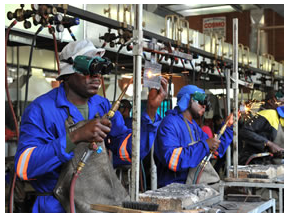 Transnet, the company behind South Africa's national transport businesses such as ports, Metrorail and South African Airways, is getting the wheels rolling to create over 5 000 jobs in the next five years.
Transnet, the company behind South Africa's national transport businesses such as ports, Metrorail and South African Airways, is getting the wheels rolling to create over 5 000 jobs in the next five years.
The company employs 55 519 people and it predicts that the number will increase to 61 520 by 2016.
New Growth Path
The increase in the number of jobs at Transnet is linked to government's New Growth Path (NGP). The NGP is a jobs campaign aimed at creating about five million job opportunities by 2020 and reducing the unemployment rate to 15 percent. The NGP has six priority areas namely: infrastructure development, agriculture, mining and beneficiation, manufacturing, the green economy and tourism.
200 000 jobs by 2016
Transnet's chief executive, Brian Molefe, said the company aimed to create a total of over 200 000 jobs directly and indirectly by 2016. He said this would be done through their projects, which focused on technical and functional skills, making up 76 percent of all the training at Transnet's six technical schools. At the company's port terminals school, it planned to train 4 205 learners in the next five years, while 2 637 others would be trained at the ports. At the rail schools, the company aimed to train nearly 7 000 students by 2016, as well as training more than 7 500 in rail engineering.
Transnet is currently taking 500 apprentices a year and hopes to increase this number to 1 000 next year.
South Africa’s creative industries are set to become more important in helping the country fight unemployment.
Arts and Culture Director-General Sibusiso Xaba said one way of boosting job creation was to look at issues which affect job creation in the arts and to upgrade the status of people working in the arts sector.
Xaba addressed delegates at the International Conference on Arts, Society and Sustainable Development at the Tshwane University of Technology (TUT) recently. The aim was to bring together scholars from Africa and abroad to debate arts and culture as a tool to economic development.
He pointed out that it was important for people working in the arts to have formal education and qualifications. Starting the National Skills Academy for the Arts later this year is part of government’s efforts to uplift the status of people working in the arts, culture and heritage sector.
TUT Executive Dean of Arts Prof Mzo Sirayi said, “Many people still see arts as an optional extra, but not central to the challenges facing the economy, public service and society as a whole... History has demonstrated that when cities, towns and villages disintegrate and degenerate, like many cities and towns in Africa, the solution should be sought in the sphere of arts and culture.”
Pushing back the frontiers of poverty
Pushing back the frontiers of poverty sadminThe EPWP is a flagship programme of the Department of Public Works. It is a means of creating a better life for all people and a better future for the youth.
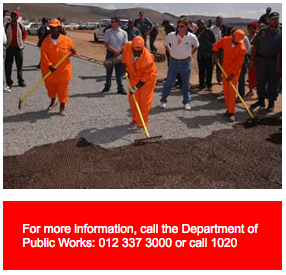 The Expanded Public Works Programme (EPWP) is playing a central role in job creation and economic development. Results show that the EPWP has created 643 116 work opportunities, which confirms that the programme is well on its way to achieving its set target of 642 000 work opportunities for this year.
The Expanded Public Works Programme (EPWP) is playing a central role in job creation and economic development. Results show that the EPWP has created 643 116 work opportunities, which confirms that the programme is well on its way to achieving its set target of 642 000 work opportunities for this year.
EPWP acting Deputy Director General Ignatius Ariyo said the performance of the programme indicates that the EPWP is on track to meet the target of 4,5 million work opportunities by March 2014.
Primary driver
"The EPWP is a primary driver of job creation within the machinery of government and I have expressed my confidence and conviction in the ability of the department to help combat joblessness and push back the frontiers of poverty within a short period of time," said Public Works Minister Gwen Mahlangu-Nkabinde.
Infrastructure sector
Ariyo said the infrastructure sector continued to contribute the largest number of work opportunities, with a total of 277 100 people employed in the this sector.
He said KwaZulu-Natal had the largest number of work opportunities, but the bulk of the jobs were created in the infrastructure sector. The province is closely followed by the Eastern Cape and Gauteng. More work still needs to be done in the Free State, Northern Cape, North West and Mpumalanga in terms of meeting the targets.
Bursaries
Bursaries sadminDepartment of Labour
Bursaries for the Disabled
Value
Tuition fees, residence fees, books and personal spending.
Duration
1 year renewable
Tenable
Any recognised university or university of technology in South Africa.
Who Can Apply
Undergraduate students with a disability, i.e. visual, hearing, physical or psychiatric. The studies must be conducive to an eventual career, and the graduate is expected to be able to work after completion of studies in their chosen field. The bursaries are limited and will be awarded to those students with financial need. Must be South African.
Closing Date: Not applicable
Address: Apply directly to the institution at which you wish to study, including most public tertiary institutions.
East Rand Youth Trust - FET college bursary
(Residents of Ekurhuleni only)
Value
Pays for full tuition and residence costs.
Duration
1 year renewable.
Tenable
Any recognised FET college in Gauteng.
Who Can Apply
Residents of Ekurhuleni Metropolitan Municipality. In addition to excellent academic qualifications, the Trustees will be looking for some of the following qualities: leadership skills, sound personal conduct and community spirit. This bursary is aimed at previously disadvantaged individuals from a household with a monthly income of less than R3000 00.
Learners should already be registered at a recognized institution in Gauteng.
Closing Date: 31 October
Address: The Trust Administrator
East Rand Youth Trust
P O Box 965
Kempton Park, 1620
FUNZA Lushaka Bursary Programme (DoE)
Value
Covers all essential expenses and varies with institution.
Duration
1 year renewable.
Tenable
Any recognised institution in South Africa.
Who Can Apply
South African citizens wanting or currently studying towards a Bachelor of Education (BEd), Postgraduate Certificate in Education (PGCE); and BA, BSc, BCom and BTech degrees with majors suitable for admission to a PGCE programme, which the recipient of the bursary will agree to enter on graduation.
Service Contract: Recipients will be required to teach one year for every year for which they receive a bursary.
Closing Date: Check with individual institutions.
Address: Check with individual institutions
Provincial Administraion Western Cape (Clinical Psychology)
Value
Amount varies
Duration
1 year renewable
Tenable
Any institution which offers the following discipline in the Western Cape.
Who Can Apply
Students who are studying Clinical Psychology and are Honours and Masters students. SA citizens only who are permanently resident in the Western Cape.
Service Contract: After completion of studies, graduates will be required to work in the Public Service for a period which corresponds to the duration of the bursary.
Closing Date: 7 September - for return of forms.
Address: Provincial Administration: Western Cape
The Director: Human Resources Development
Department of Health
P O Box 2060
Cape Town, 8000
Provincial Administraion Western Cape (Occupational Therapy )
Value
Amount varies.
Duration
1 year renewable.
Tenable
Any institution which offers the following discipline in the Western Cape.
Who Can Apply
Students who are studying BSc Occupational Therapy / B Occupational Therapy. Students must be in their FIRST YEAR of study and permanently resident in the Western Cape.
Service Contract: After completion of studies, graduates will be required to work in the Public Service for a period which corresponds to the duration of the bursary.
Closing Date: 7 September
Address: Provincial Administration: Western Cape
The Director: Human Resources Development
Department of Health
P O Box 2060
Cape Town, 8000
Department of Agriculture
Tenable
Institutions offering Agriculture and Veterinary Science.
Who Can Apply
Grade 12 learners, unemployed graduates, students already at a tertiary institution.
Closing Date: 30 August
Address: The Senior Manager
Directorate Education, Training and Extension Services
Department of Agriculture
Private Bag X250, Pretoria, 0001
Free State: Department of Education
Value
R4 500 per annum full-time, R1 000 per annum part-time.
Duration
1 year renewable.
Tenable
Any South African institution, preferably in the Free State.
Who Can Apply
Students who are studying Teaching and who intend to pursue a career in the Free State. The bursary is renewed according to examination results which have to reach the Department before 31 July.
Service Contract: No
Closing Date: 31 August
Address: Head Education Department OFS
Private Bag X20565
Bloemfontein, 9300
National Arts Council of SA
Value
Amount varies.
Duration
1 year renewable.
Tenable
Any South African university or university of technology offering this course, or internationally.
Who Can Apply
Postgraduate students who are studying Theatre, Drama, Dance Choreography, Music.
Please note: Institutions must apply to the NAC for registration; Block funding is available to institutions for undergraduate study; Postgraduate students must apply directly to the NAC in writing (see website for application forms); Undergraduate students must apply to their institutions for an NAC bursary.
Closing Date: 15 September for study in South Africa; 15 February for international study - both dates for return of forms.
Address: National Arts Council of SA
P O Box 500, Newtown, 2113
www.nac.org.za
, E-mail: info.@nac.org.za
National Arts Council of SA
Value
Amount varies.
Duration
1 year renewable.
Tenable
Any South African university or university of technology , or internationally.
Who Can Apply
Postgraduate students who are studying Music: jazz, popular, enthno-musicology, indigenous, serious, choral.
Please note: Institutions must apply to the NAC for registration; Block funding is available to institutions for undergraduate study; Postgraduate students must apply directly to the NAC in writing (see website for application forms); Undergraduate students must apply to their institutions for an NAC bursary.
Service Contract: No
Closing Date: 15 September for study in South Africa;
15 February for international study - both dates for return of forms.
Address: National Arts Council of SA
P O Box 500
Newtown, 2113
www.nac.org.za
, E-mail: info.@nac.org.za
Western Cape: Department of Transport and Public Works
Value
Study fees, registration fees, examination fees, cost of prescribed study materials.
Duration
Available from, but not limited to, first year of study.
Tenable
Higher Education Institution in Western Cape.
Who Can Apply
Preference given to historically disadvantaged individuals and/or physically disabled.
Service Contract: Services must be at disposal of department during and upon completion of studies, formal agreement must be entered.
Closing Date: 5 October
Address: Tertiary Education Officer
Component: Human Resource Development
Department of Transport and Public Works
Private Bag X9185
Cape Town, 8000
jsisaacs@pgwc.gov.za
Tel: 021 483 3547: Fax: 021 483 7547
South African National Council for the Blind bursary
Value
Maximum of R15 000 (tuition only).
Who Can Apply
This bursary is awarded annually to blind or partially sighted students for tertiary study in any suitable field. Medical proof of visual disability is required.
Closing Date: 30 September
Classroom change to fight climate change
Classroom change to fight climate change sadminYouth matters
Government is working towards ensuring that environmental awareness forms part of and is central to all teaching material at schools.
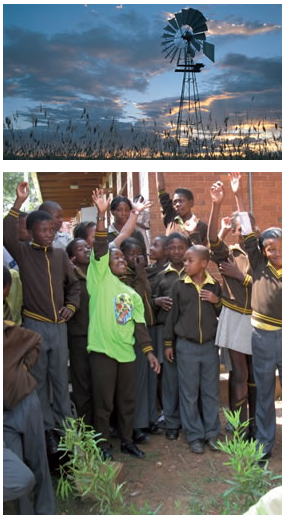 With the problem of climate change now becoming more serious, the South African government is taking environmental awareness to the youth. Basic Education Deputy Minister Enver Surty said officials were working towards ensuring that environment awareness formed part of and is central to all teaching material at schools.
With the problem of climate change now becoming more serious, the South African government is taking environmental awareness to the youth. Basic Education Deputy Minister Enver Surty said officials were working towards ensuring that environment awareness formed part of and is central to all teaching material at schools.
He was addressing delegates at the third annual Youth Water Summit organised by the Department of Water Affairs in Johannesburg last month.
The summit was introduced three years ago and is used as a platform to educate learners about the impacts of climate change. Since it was started, it has launched awareness programmes in rural schools across the country.
COP17 congress
With South Africa hosting the 17th United Nations Congress of Parties (COP 17) on climate change in a few months time, the Water Summit gave the floor to young citizens from all nine provinces and several other countries to share and discuss water and the need to take better care of the environment.
The COP 17 conference will be held in Durban in December and more than 100 heads of state will be attending. Its aims are to educate the world about the dangers of climate change and finding solutions to the problem.
Young people
Young people at the Water Summit all agreed that they had an important role to play and that it was up to them to help reverse the damage caused by global warming. They made a commitment to take action and to encourage others to take better care of the environment.
Water Affairs Deputy Minister Rejoice Mabudafhasi said that water shortages and climate change were among the greatest challenges to South Africa’s development. The problem had been worsened by unreliable rainfall and the needs of agriculture and industries.
Alien tree and plant species, which have a great impact on water shortage is also making the problem worse. The result is that some municipalities have been forced to restrict water use.
Vision 2020
“We started the youth summit as part of our Vision 2020, with the knowledge that if we don’t do something now and educate the youth about the importance of protecting water and the environment, we may be in trouble ... We want to instil that knowledge in them that water is important in their lives,” said Mabudafhasi.
As part of Vision 2020, 281 computers have been distributed to schools in Limpopo, North West, Eastern Cape, KwaZulu-Natal, Northern Cape and Mpumalanga to help learners understand the importance of science and climate.
COP 17 is the 17th Conference of Parties of the United Nations Framework Convention on Climate Change. It is one of the world’s largest conferences and will take place in Durban from 28 November to 8 December this year. More than 30 000 people are expected to attend, making it the largest event ever hosted in a South African city. The Durban KwaZulu-Natal Convention Bureau has estimated that the economic benefits for Durban will be enormous and rough estimates regarding money spent by delegates could be more than R300 million.
Department of Environmental Affairs on 086 111 2468 or 012 310 3911
What is climate change?
What is climate change? sadminYouth matters
Climate change refers to changes in the world’s climate that take place over a period of time. It includes changes in air temperatures, rain patterns, humidity, pressure systems and winds. Climate change can be caused by natural processes such as variations in the sun’s activity, but human activities also play a part.
 Air pollution from power stations, factories, cars and other sources related to human activities give off gases and tiny solid particles called aerosols. Typically, many of these gases are greenhouse gases like carbon dioxide, which is released when fossil fuels like coal and oil are burnt.
Air pollution from power stations, factories, cars and other sources related to human activities give off gases and tiny solid particles called aerosols. Typically, many of these gases are greenhouse gases like carbon dioxide, which is released when fossil fuels like coal and oil are burnt.
Human beings, animals and the environment in which we live are sensitive to climate change. Human health, agri-culture, natural ecosystems, coastal areas, and heating and cooling needs are examples of systems that are sensitive to climate.
Rising average temperatures are already affecting the environment. In South Africa, we are experiencing things like droughts in the Eastern Cape, unusual rain patterns in the Southern Cape and floods in other parts of the country. This has negative impacts on the environment, as well as the economy. To lessen the damage done, government is putting in place projects to curb climate change.
The way in which climate change effects the environment and whether these effects prove harmful or beneficial, will vary by region, over time. The impact of the effects also depend on the ability of societies and environmental systems to adapt to or cope with the change.
The Intergovernmental Panel on Climate Change (IPCC) is a world body that uses scientific, technical and socio-economic information to investigate the causes and effects of climate change and look at solutions to the problems.
Meet Ms Rejoice Mabudafhasi
Meet Ms Rejoice Mabudafhasi sadminKnow your Deputy Minister
Born in May 1943, Ms Rejoice Mabudafhasi was appointed Deputy Minister of Water and Environmental Affairs in May 2009. Prior to that, she had been a Deputy Minister of Environmental Affairs and Tourism between 1999 and 2009. In 1985 and 1986 she was a founder member and National Organiser of the National Education Co-ordination Committee (NECC). From 1992 to 1994 she was a National Treasurer of the National Education Health and Allied Union (NEHAWU), an affiliate of Cosatu.
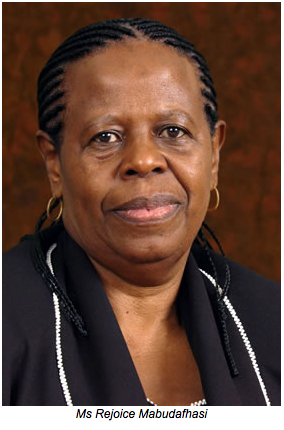 Ms Mabudafhasi is chairperson of the African Process for the Development and Protection of the Marine and Coastal Environment. She is also Chairperson of the Mvula Trust Board and a member of the Global Programme of Action (GPA). She is a member of the International Committee on Business Partners for Development for Water and Sanitation. She has been co-chair of the Global Network of Women Ministers and Leaders of Environment since 2004. She has been a member of the National Executive Council (NEC) of the African National Congress (ANC) since December 2007.
Ms Mabudafhasi is chairperson of the African Process for the Development and Protection of the Marine and Coastal Environment. She is also Chairperson of the Mvula Trust Board and a member of the Global Programme of Action (GPA). She is a member of the International Committee on Business Partners for Development for Water and Sanitation. She has been co-chair of the Global Network of Women Ministers and Leaders of Environment since 2004. She has been a member of the National Executive Council (NEC) of the African National Congress (ANC) since December 2007.
From 1962 to 1963, she was a teacher at Tshilidzi School, Soweto and in 1965, she was appointed a librarian at the University of the North. From 1983 to 1986, she served as a secretary for United Democratic Front in the then Northern Transvaal (UDF).
Is your water leaking?
Is your water leaking? sadminKnow your Deputy Minister: Water and Environmental Affairs
The Gauteng Region of the Department of Water Affairs is using a community empowerment programme to address youth unemployment, skills development, water losses and river pollution.
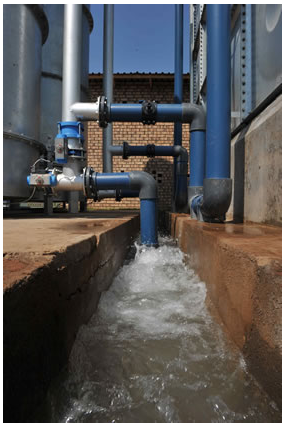 The Community Empowerment Programme forms the core of the Department of Water Affairs’ Water Sector Advocacy programme. Four programmes are being put into place in the Gauteng Province involving several municipalities.
The Community Empowerment Programme forms the core of the Department of Water Affairs’ Water Sector Advocacy programme. Four programmes are being put into place in the Gauteng Province involving several municipalities.
The programmes include the War on Leaks, the training of process controllers on water and waste-water treatment works, Sebenza Nathi for Unemployed Graduates, Women in Water and the Adopt a River Project.
War on Leaks
The War on Leaks programme, which started in Gauteng, aims to address water losses in Mogale City (Krugersdorp). Ten young people from Mogale City were trained and employed as Water Demand Management Assistants.
The programme is being extended to other municipalities in the Gauteng area including Westonaria, Kungwini Municipality in Bronkhorstpruit and Lesedi.
During the second phase of the programme, Mogale City will receive R1,1 million in funding, while the City of Johannesburg will receive R20 million in funding.
Schools and households
The programme is carried out at 21 schools and 200 households with the aim of bringing down the total water loss due to water leaks to R5 million in the next five years. It is estimated that almost R100 million is lost because of water leaks in Gauteng alone.
The War on Leaks programme also aims to help reduce the problem of high water bills for consumers. It is hoped that this will also promote a habit of residents paying for services.
Adopt a River
Regarding the Adopt a River programme, the Department of Water Affairs’s Gauteng region is undertaking a cleaning campaign, which employs women and youth living near the Kaalsrpruit.
In future, the programme will be extended to cleaning other rivers like the Jukskei and Morelete.
Making fire like the granny
Making fire like the granny sadminKnow your Deputy Minister: Water and Environmental Affairs
A new method of making coal fires has been taken to communities to help prevent pollution of the environment and reduce the dangers associated with winter fires.
The new method was announced by Deputy Minister of Water and Environmental Affairs Rejoice Mabudafhasi during the launch of the Winter Clean Fires campaign recently.
Make fire like the granny
The “Basa Njengo Magogo” (make fire like the granny) method is aimed at reducing outdoor pollution, which results from burning coal, especially in low-income households or settlements.
Basa Njengo Magogo is a ‘top-down’ model of making coal fire discovered by Granny Maria Nobelungu Mashinini of eMbalenhle in Secunda.
Unlike the popular traditional way, the new method is done by putting coal first, then paper, followed by wood and then lighting the fire. When the wood catches fire, one puts a handful of coal on top to light the coal at the bottom.
“With this method, the fire in the stove or imbawula (self-made movable stoves) will be ready for use much sooner. It will save you coal and money, it will burn longer, your health will improve and you will be able to see longer distances due to the massive reduction of smoke emissions,” said Mabudafhasi. The method is being rolled out in Gauteng, Mpumalanga and Free State, where coal use is at the highest.
Granny Mashinini
Granny Mashinini said she learned to make fire in this way from the elders when she was 11 years old.
“They would tell me that I must make a fire using the method to protect the young children from inhaling smoke, which brings many sicknesses. Now that you know the method too, spread the word so that you may save many lives and protect our environment,” said Mashinini.
To the rescue when other systems fail...
To the rescue when other systems fail... sadminPresidential Hotline
The Presidential Hotline is a government service that is offered free of charge to everyone who uses it. But callers are reminded that the hotline and public liaison service does not replace the existing hotlines and public liaison facilities of departments, provinces or municipalities. It is intended to be used as a last resort when other systems have failed.
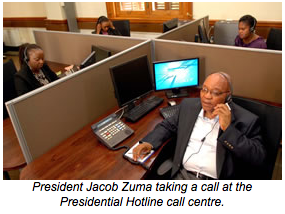 A sixteen-year old Pretoria learner is full of praise for the Presidential Hotline, which made it possible for him to represent South Africa in the World Rowing Championships in England this month.
A sixteen-year old Pretoria learner is full of praise for the Presidential Hotline, which made it possible for him to represent South Africa in the World Rowing Championships in England this month.
Realising his dream
Katlego Sotsaka's mother Maite Sotsaka contacted the Presidential Hotline complaining about the service at the Pretorius Street branch of the Department of Home Affairs.
She applied there for an identity document (ID) for her son, but was told that she would have to wait for three weeks to apply for a temporary ID since her son's fingerprints would only be available on the system by then.
After three weeks, she was told that the fingerprints were not yet on the system. On receiving her complaint, the Presidential Hotline staff contacted the Home Affairs Public Liaison Officer about the matter.
Within 24 hours Katlego received his temporary ID. He eventually got his passport and a visa and realised his dream to go to England to represent his country in the World Rowing Championships.
Lighting up
In another success story, the involvement of the Presidential Hotline resulted in providing electricity at the house of a Mahikeng resident in May this year after more than two years without electricity.
In February this year, Mr Gabriel Zubane wrote a letter to the Presidential Hotline complaining that his house had no electricity while his neighbour's did. Zubane had applied for electricity at the local Eskom office in 2009 and by February 2011, he had heard nothing from them.
The matter was referred to Mr Johannes Mokobane at the Department of Energy for investigation. It was later discovered that the process was delayed because Mr Zubane was given electricity which was not suitable for a household. The problem was never addressed and he was not informed. He decided to contact the Presidential Hotline.
He was advised to reapply for electricity and did so on 20 May 2011. A week later, Eskom brought material to his house, but it was too late for them to work at the house and he was told they would come back later, but after a week they had not returned.
Zubane informed the Presidency of the situation. To Zubane's great relief his house was electrified two weeks later thanks to the Hotline's intervention.
Birth certificate
The Hotline also came to the rescue of Dudu Mgobhozi from KwaZulu-Natal, who tried for three years to get a birth certificate for her daughter without luck.
In 2008, she delivered her baby at a clinic in eSikhawini outside Empangeni in KwaZulu-Natal North. However, she gave the nursing staff her nickname instead of the name on her ID. This caused a problem when she applied for a birth certificate for the child at the Richards Bay branch of Home Affairs since the names did not match. Home Affairs staff advised her to take the form to the Clinic to confirm that it was her child.
Over a period of three years she could not get the nurses to fill in and stamp the forms. Mgobhozi contacted the Hotline to help her apply for her daughter's certificate. Staff at the clinic where she gave birth refused to fill in a Home Affairs form that would have enabled her to apply for a birth certificate.
After the Presidential Hotline's intervention through the Office of the Premier in KwaZulu-Natal, the matron at the eSikhawini Clinic completed and stamped the form enabling Mgobhozi to apply for her daughter's birth certificate.
Compensation for her loss
The Presidential Hotline does not only solve problems relating to government departments, but has also helped customers of state-owned companies such as the national airline, South African Airways (SAA).
Ms Naziemah Lesch whose handbag went missing about five years ago while flying with SAA contacted the Presidential Hotline when she received no help or compensation from the airline. Lesch filed a complaint with SAA in 2006, but until this year she was still waiting for a response from them.
The Presidential Hotline contacted the Luggage Department at the Cape Town International Airport. After discussions between the two parties, Lesch was paid for her loss. She had been struggling to resolve the matter for almost three years.
Disability
Another problem solved involves a Western Cape man, Mr Moosa Essop, who had retired because of ill health from injuries he sustained on duty. Thanks to intervention from the Hotline his disability grant was paid to him again after it had been cancelled for eight years.
Mr Essop was receiving a disability grant from the South African Social Security Agency (SASSA), but this was cancelled when he applied for compensation funds for his injuries.
Essop depends on monthly medication. In addition to being disabled and unemployed his family depend on him and had been waiting to be compensated for the past eight years. After eight years of trying to get help from the Labour Department, he decided to contact the Presidential Hotline.
The Hotline contacted the SASSA office in Belville, which then interviewed Essop as a requirement for his a disability application. The interview was successful and it was decided that a once- off cheque payment, would be given to Essop to assist him in the interim, and it was delivered to his home. This is making life much easier for Essop and his wife who were emotionally moved by the help they received from the Presidential Hotline.
Another Presidential Hotline success story involves a disabled man from Belhar in the Western Cape, Mr Collin Diedericks, who was struggling to replace his broken wheelchair. He informed the councillor of his ward about his struggle, but his efforts were in vain. When he heard that a Presidential Hotline had been launched in September 2009, he immediately decided to turn to the President for help.
Thanks to intervention from the hotline, a team from the Western Cape Department of Social Development visited Diederick to assess his situation. They found that he was using a wheelchair belonging to a day-hospital in Belhar.
When the Department of Social Development received a donation of equipment for disabled people from the Taiwanese government, Diedericks met the criteria and he received a new wheelchair.
17737 (1 PRES)
Fax: 086 681 0987 or 012 323 8246
email: president@po.gov.za
Leaders committed to direct more resources to Africa's you
Leaders committed to direct more resources to Africa's you sadminInternational relations
African leaders, including President Jacob Zuma have promised to ensure that young people become part of decision-making processes.
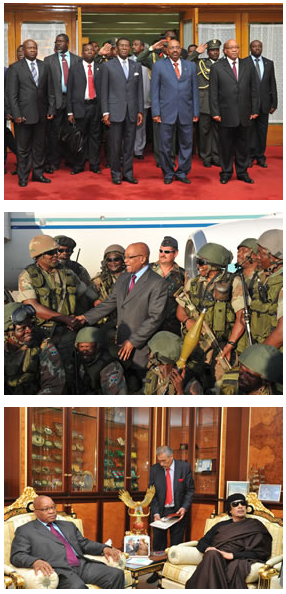 African leaders who form part of the African Union (AU), made a commitment during a summit in Malabo, Equatorial Guinea, recently to put into practice policies that create safe, decent and competitive job opportunities for young people. This decision was influenced by the 20 million young Africans seeking employment in a labour market that was not ready to receive such a high number.
African leaders who form part of the African Union (AU), made a commitment during a summit in Malabo, Equatorial Guinea, recently to put into practice policies that create safe, decent and competitive job opportunities for young people. This decision was influenced by the 20 million young Africans seeking employment in a labour market that was not ready to receive such a high number.
Youth empowerment schemes
At the meeting President Zuma acknowledged that African governments need to direct more resources toward youth empowerment schemes.
He said the youth represented the future of the continent and therefore have a role to play.
"Given the challenges of illiteracy, unemployment, lack of skills, under-empowerment, irrelevant education, lack of access to capital, poverty, diseases, including HIV and AIDS and forced migration, it is important to mobilise the youth in our respective countries to focus on the task of development and nation building," said President Zuma.
Peace in Libya
At the summit, President Zuma, who is also part of an AU committee on Libya, took part in several sub-meetings that aimed at reaching a peaceful solution in Libya.
President Zuma and his team have developed a plan that will benefit all the parties in that country while bringing peace.
The five-month long civil war in Libya, a north African nation with the continent's biggest oil reserves, has driven up the price of oil and left tens of thousands of people homeless.
South Africa's participation in the AU was in line with government's vision of the African continent that is prosperous, peaceful, democratic, non-racial, non-sexist and united and which contributes to world affairs.
Building up relations abroad for a better life at home
Building up relations abroad for a better life at home sadminInternational relations
President Jacob Zuma has travelled to several countries during the past months and questions have been raised by members of the public about how this benefits ordinary South Africans.
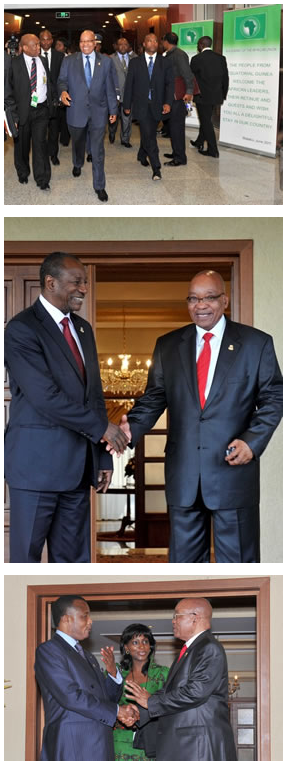 The aim of President Zuma's overseas visits is to build up good relations that will help us meet our political, social and economic goals. During such visits several deals are signed which will benefit South Africa in different fields. These include health care and education, rural development, safer communities, social security, trade and economic growth.
The aim of President Zuma's overseas visits is to build up good relations that will help us meet our political, social and economic goals. During such visits several deals are signed which will benefit South Africa in different fields. These include health care and education, rural development, safer communities, social security, trade and economic growth.
Arican countries
President's Zuma often visits other African countries because African countries in general can become South Africa's major partners, given their rich natural and mineral resources.
Since being elected as president, Zuma has visited Angola, Lesotho, Zambia, Uganda, the Democratic Republic of Congo and Libya. A visit to Sudan is also planned.
Outside Africa, he has undertaken state and official visits to the United Kingdom, Brazil, Russia, India, China and Paris.
Besides securing deals to improve the lives of ordinary South Africans, the visits serve to make useful and valuable contributions to bringing peace to countries where there is unrest or where monitoring or mediation is needed like in Sudan, Central Africa, Zimbabwe and Libya.
Other government officials
Other government officials like Deputy President Kgalema Motlanthe and International relations Minister Maite Nkoana-Mashabane have also visited different countries, including the United Kingdom, the United States of America, Cuba and Mali.
International organisations
This year, South Africa is enjoying membership in two major international organisations: The United Nations Security Council (UNSC) and the Brazil, Russia, India China and South Africa partnership (BRICS).
The Security Council is the United Nations' most powerful body. It has the power to determine sanctions and military intervention against other countries that break international laws or do not honour agreements.
South Africa intends using its position in the Security Council to promote plans for Africa's development and bring peace to the continent. It will also build close partnerships and promote more discussions with the other members of the Security Council.
Being part of BRICS will boost economic integration, trade and investment and improving good governance, not only for South Africa but the continent as a whole.
World stage
South Africa's ongoing interaction with other countries through presidential visits and involvement in international organisations will continue to promote our country on the world stage.
How can the Consumer Protection Act help you?
How can the Consumer Protection Act help you? sadminEvents and advice
The Consumer Protection Act (CPA) has been in operation since 1 April, aimed at promoting fairness, openness and good business practice between suppliers of goods or services and the people who buy such goods and services.
Contracts
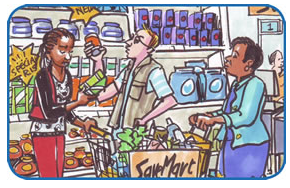 The Act only applies to contracts signed after 1 April, and won't affect anything signed before then.
The Act only applies to contracts signed after 1 April, and won't affect anything signed before then.
Regarding agreements and bookings, consumers will be pleased to know that they are now allowed to cancel an agreement or a booking under certain conditions.
Another important benefit of the Act is that a consumer can get a refund for a faulty item without having to prove that the item was not working properly at the time he or she bought it.
Goods covered by the Act:
- consumables (food, clothing etc)
- other goods that can’t be consumed but can still be used and enjoyed by a consumer, like toys and appliances
- content and entertainment products (books, music, movies, games, information products, software), including the licences to use those products
- a legal interest in fixed property
- gas, water and electricity.
Services covered by the Act:
- building, renovation and/or repair services
- education, information, advice or consultative services (doctors, lawyers, training companies, universities etc.)
- banking and insurance services not regulated under the Financial Advisory and Intermediary Services Act (FAIS Act), Long Term and Short Term Insurance Acts
- transportation services (tour buses, taxis, lift clubs)
- accommodation and hospitality services (hotels, B&Bs, restaurants)
- entertainment services (cinemas, theatres, fun parks, casinos)
- electronic communication access services (cellphone, internet, email)
- rental services (suit hire, home rentals, car hire)
- franchise services.
Services not covered:
- Estate agents: According to the National Consumer Commission Deputy Commissioner Ebrahim Mahomed, estate agents do not fall under the CPA since they are governed by the Estate Agency Affairs Act.
- Property Lease Agreements: These are governed by the Rental Housing Tribunal Act.
- Insurers: Long-term and short-term insurance have been excluded from the CPA until October 2012 when the Long and Short-Term Insurance Acts would have been brought into line with the CPA.
A consumer is any individual, small business (with annual profit below R3 million), club or association to whom goods or services are marketed and sold and any end users of those goods and services. For example, everyone who buys groceries, clothes and households goods is a consumer
National Consumer Commission on: 0860 266 786 or
send a fax to 0861 515 259 or
an email to ncc@thedti.gov.za
Plant a tree this Arbor Week
Plant a tree this Arbor Week sadminEvents and advice
In South Africa, National Arbor Week is celebrated every year from 1 to 7 September. Arbor Week is an opportunity for the Department of Water Affairs to make people aware of the importance of planting trees, the role of trees in our daily lives and how they benefit the environment.
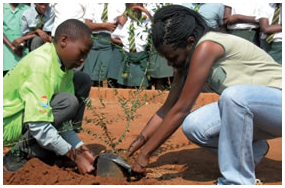 Can you imagine a world without trees? Trees are not only beautiful, they also give shelter, shade and food to humans and animals. They filter pollution from the air and their roots prevent soil erosion. We use wood from trees to make fires, for building houses and making furniture. We make paper and matches from trees and the fruit and bark of some trees are used to make medicine. Birds build their nests in the branches and bees make honey from nectar they get from the flowers.
Can you imagine a world without trees? Trees are not only beautiful, they also give shelter, shade and food to humans and animals. They filter pollution from the air and their roots prevent soil erosion. We use wood from trees to make fires, for building houses and making furniture. We make paper and matches from trees and the fruit and bark of some trees are used to make medicine. Birds build their nests in the branches and bees make honey from nectar they get from the flowers.
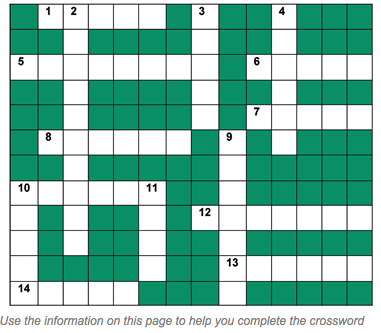
Across
1. They made with wood for cooking and heating
5. Made from the fruit and bark of trees for healing
6. A product made from trees that we can write on
7. It grows on trees and we can eat it
8. Bees get this from flowers to make honey
10. This tree can live up to 3 000 years
12. It is made from trees and we use it to light fires
13. Nectar is found in it
14. Trees give us shelter and ...
Down
2. A tree that grows naturally in an area or country is ...
3. The largest living things on earth
4. We make these from wood to sit on
9. A tall spotted animal that eats leaves
10. They build their nests in the branches
11. They make honey
- The word 'Arbor' means a shady resting place in a garden or park, but is now generally used in relation to trees.
- South Africa has more than 1 000 indigenous trees (indigenous means they grow naturally in a certain region or country).
- The yellowwood tree is South Africa's national tree.
- Trees are the largest living things on earth. Some species grow up to 100 metres tall and can weigh up to 600 tonnes.
- Most trees live longer than people - many live up to 100 or 200 years, but some live even longer, like the baobab tree, which can live as long as 3 000 years!
- About half of the world's population use wood to make fires for cooking and heating.
- One marula tree can bear more than 10 000 fruits at a time. They are very rich in vitamin C.
Honour for Rivonia treason accused
Honour for Rivonia treason accused sadminHistory
The Department of Arts and Culture together with its public entity, the National Heritage Council has honoured the four surviving Rivonia treason accused 48 years after they had been sentenced to life.
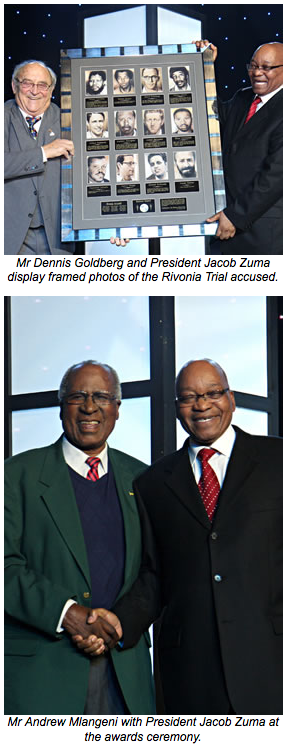 During the ceremony held at the Sandton Convention Centre recently, President Jacob Zuma also honoured the four surviving former accused and said for Government, Lilliesleaf Farm and the subsequent Rivonia Trial is an important part of South Africa's liberation heritage.
During the ceremony held at the Sandton Convention Centre recently, President Jacob Zuma also honoured the four surviving former accused and said for Government, Lilliesleaf Farm and the subsequent Rivonia Trial is an important part of South Africa's liberation heritage.
The famous Rivonia Trial drew worldwide attention to the former South African government's policy of racial segregation. The trial also changed the course of South African history.
The awards ceremony to honour some of the surviving former accused in the Rivonia Treason Trial had been planned to take place on 11 June – exactly 48 years to the day they had been sentenced. However, the ceremony had to be postponed to 11 July, due to the death of Albertina Sisulu, wife of the late anti-apartheid struggle veteran Walter Sisulu.
Still living
Of the original accused in the famous treason trial, only four are still live. These are former President Nelson Mandela, Ahmed Kathrada, Dennis Goldberg and Andrew Mlangeni. Charged with the four were Walter Sisulu, Govan Mbeki, Rusty Bernstein, Wilton Mkwayi, Raymond Mhlaba, James Kantor, and Elias Motsoaledi.
Of the ten originally accused, only Bernstein and Kantor were not found guilty while the rest were sentenced to life. All the convicted accused except Goldberg were imprisoned on the Robben Island where they spent more than 20 years of their sentences before they were moved inland at Pollsmoor Prison in Cape Town.
Posthumous awards
Family members of the accused who have since passed on will receive posthumous awards on behalf of their relatives.
Some of them were arrested during a police raid of Liliesleaf Farm in Rivonia in northern Johannesburg. The South African Communist Party (SACP) bought the in 1961 as its headquarters.
The farm is now a museum among the many other museums including the Nelson Mandela Museums under the National Heritage Council and the Arts and Culture Department.
In the raid, police found all documents belonging to Umkhonto we Sizwe, one of which had been Operation Mayibuye, a plan to change to violence to overthrow the apartheid government.
Heroism
The Arts and Culture Department and the National Heritage Council have jointly planned the awards ceremony with the Umkhonto we Sizwe Military Veterans Association (MKMVA).
MKMVA Chairperson Mr Kebby Maphatsoe said the decision to honour those charged with the Rivonia High Treason trial was in recognition of their heroism.
"The awards ceremony will highlight the contribution to South Africa's freedom by a range of heroes who dedicated their lives to achieve South Africa's democracy and freedom," Maphatsoe added.
Bafana holds onto its name
Bafana holds onto its name sadminSport & recreation
The name Bafana Bafana has become part and parcel of South African football and most fans cannot imagine them being called by any other name.
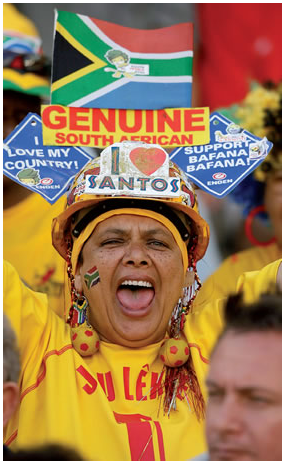 The battle to own the full rights of the name Bafana Bafana between the South African Football Association (Safa) and Stanton Woodrush is finally over. Safa's fourth Vice President, Dr Danny Jordaan, announced last month that the South African national team would continue to be known as Bafana Bafana.
The battle to own the full rights of the name Bafana Bafana between the South African Football Association (Safa) and Stanton Woodrush is finally over. Safa's fourth Vice President, Dr Danny Jordaan, announced last month that the South African national team would continue to be known as Bafana Bafana.
Settlement
"We are pleased to announce that we've reached a settlement with Stanton Woodrush two days ago on the Bafana Bafana name issue. As a result of our agreement, the name Bafana will now be exclusively owned by Safa," he said.
He said they had reached an agreement with Woodrush to transfer the trademark rights in Bafana Bafana to the association. However, the agreement did not come cheap – but with a price tag of a whopping R5 million payable over a period of twelve months.
Legal route
Woodrush registered the name Bafana Bafana in 1993, a year after the South African national men's team was re-admitted to participate in global sporting events and during that period, the team was known as Bafana Bafana.
As a result, the then leadership of Safa, led by the late Solomon "Stix" Morewa decided to take the legal route to fight the right to own the name Bafana, but they lost. In 2005, the Safa leadership entered a partnership agreement with Woodrush under the joint venture company, SLAM, to commercialise the Bafana Bafana rights.
Our boys remain our boys
According to Jordaan, when the leadership of Safa was elected in 2009, they took a decision to find a new name for the national team or to reach a settlement with Woodrush. Now that the Bafana Bafana name belongs to the association, Woodrush will have no interest in the name or any trademark rights associated with the name. And so our boys will remain our boys.